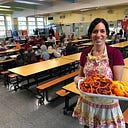Member-only story
Here’s How Universities Are Dealing with Student Hunger on Campus
Food insecurity among college students is on the rise
A graduate of Kennedy-King, one of the City Colleges of Chicago, Cindy Alvarez is 42 and has five children; she is the first in her family to go to college. When she graduated in May, she was also Kennedy-King’s valedictorian.
But Alvarez was also a frequent customer and an employee at CCC’s food pantry. Regular and free access to food played a huge role in allowing her to focus on her studies.
“It was very exciting to have the ability to go to school, but at the same time it is an extra pressure on the budget,” she says. “I saw the food court and the campus restaurants, but I could not afford that. I used the food pantry like many of our adult students do because we have to go home and feed our families.”
Alvarez is not alone. A 2019 survey from Temple University’s Hope Center for College, Community, and Justice found that 45 percent of student respondents from over 100 institutions said they had been food insecure in the past 30 days.
According to a report by the National Student Campaign Against Hunger & Homelessness, of the college students who are food insecure, 53 percent reported missing a class, 54 percent missed a study session, 55…

